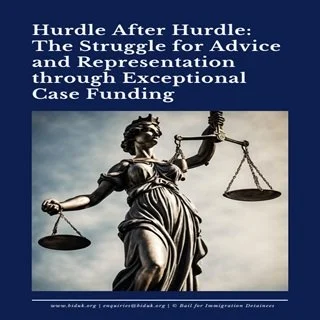By Emily Ryo and Reed Humphrey
Removal proceedings are high-stakes adversarial proceedings in which immigration judges must decide whether to allow immigrants who allegedly have violated U.S. immigration laws to stay in the United States or to order them deported to their countries of origin. In these proceedings, the government trial attorneys prosecute noncitizens who often lack English fluency, economic resources, and familiarity with our legal system. Yet, most immigrants in removal proceedings do not have legal representation, as removal is considered to be a civil matter and courts have not recognized a right to governmentappointed counsel for immigrants facing removal. Advocates, policymakers, and scholars have described this situation as an access-to-justice crisis or a representation crisis for immigrant communities. The prevailing wisdom suggests that the solution to this crisis is more lawyers or more nonlawyer practitioners, such as accredited representatives and legal technicians, who can provide affordable and quality legal services. The focus, therefore, has been on the ubiquity of "legal deserts," commonly defined as areas that are in shortage of lawyers, and on ways to increase the supply of legal service providers in the marketplace.
This Article presents an empirical study of legal representation that unsettles this prevailing wisdom by showing why an adequate supply of legal service providers is a necessary, but not a sufficient, condition to address the representation crisis. Our study uses a new and original dataset that we compiled for the purposes of this study on immigration lawyers and non-detained immigrant respondents in removal proceedings. Our findings suggest that although the focus on the supplyside dimension of the representation crisis is important, it obscures other complex sets of barriers to obtaining legal representation that are distinct from the problem of legal deserts. Specifically, our empirical analyses show that whether a non-detained immigrant respondent obtains legal representation is predicted by where they reside, their primary language, and the size of their conational social networks, controlling for the availability of practicing immigration lawyers in close proximity to their places of residence and other potential confounders. In short, we argue that geography, language, and networks are destiny for immigrant respondents when it comes to obtaining legal representation. Thus, addressing the representation crisis requires looking beyond the problem of legal deserts to attend to a variety of other hurdles to obtaining legal representation that are associated with certain geographical, linguistic, and social isolation in which many immigrants live.
101 North Carolina Law Review 787-840 (2023), 54 pages






